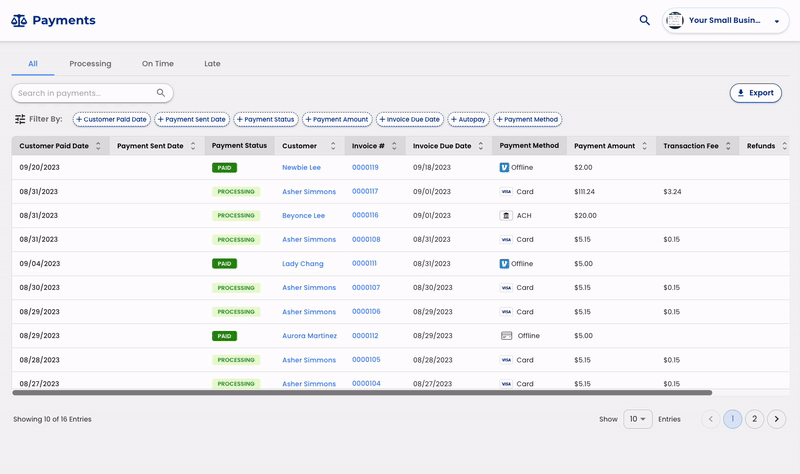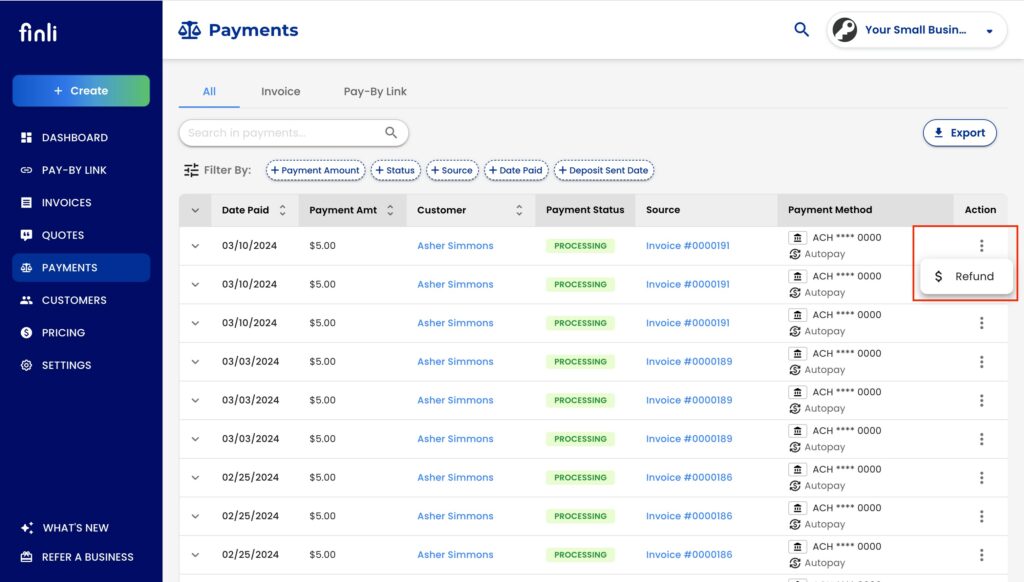A refund is the return of money to a customer who is dissatisfied with a product or service. It occurs when the product is defective, incorrect, or doesn’t meet expectations. Refunds resolve disputes, comply with consumer laws, and maintain customer trust and satisfaction.
Are refunds easy to manage? With Finli, yes they are.
When Would a Business Need to Issue a Refund?
No business owner likes to refund money for a product or service already provided, but in some cases this is the right way to close a dispute. While some customers might try to use this feature to get freebies, in most cases the clients who are requesting refunds are entitled to this.
When situation arises you might consider a refund, in order to keep the client happy and not risk a flurry of negative reviews. Here is why, as a business, you may need to issue a refund:
- Product Defects or Damages: If an item is found to be defective or damaged upon delivery, the customer is entitled to a refund.
- Incorrect Product: If the customer receives a different product than what was ordered, the business should issue a refund.
- Customer Dissatisfaction: If the customer is unhappy with the product or service and it does not meet their expectations or advertised quality, a refund may be necessary.
- Service Not Rendered: If a service was paid for but not delivered, the business must refund the payment.
- Subscription Cancellations: For subscription-based services, if a customer cancels within a specified period, they might be eligible for a refund. While it’s easy to handle subscriptions with Finli’s digital payment processing, if the client was charged for a new month, for instance, and they don’t need your services anymore, refunding them is a breeze.
- Overcharging: If there was an error in billing that resulted in the customer being overcharged, the business should correct the mistake by issuing a refund.
- Promotional Guarantees: Some businesses offer money-back guarantees as part of their promotional strategy. If a customer is not satisfied within a certain period, they are entitled to a refund.
- Compliance with Consumer Protection Laws: Many regions have consumer protection laws that require businesses to issue refunds under certain circumstances to ensure fair treatment of customers.
- Payment Errors: If there was a duplicate charge or a payment was made in error, a refund is necessary to rectify the situation.
- Event Cancellations: For events or services that are canceled by the business, customers who prepaid must receive refunds.
Issuing refunds promptly and courteously can help maintain customer trust and satisfaction, even in the face of a problem.
What Are the Benefits of Issuing a Refund
Issuing refunds can offer several benefits to a business, enhancing its reputation and customer relations. Here are the key advantages:
- Customer Loyalty: Providing refunds when warranted can build trust and encourage repeat business, demonstrating that the company values customer satisfaction.
- Positive Reputation: A business known for its fair refund policy is likely to enjoy a better reputation, attracting more customers through positive word-of-mouth.
- Conflict Resolution: Refunds can quickly resolve disputes and prevent escalation, saving time and resources that might otherwise be spent on handling customer complaints.
- Compliance: Adhering to consumer protection laws and offering refunds when required ensures the business remains compliant with regulations, avoiding legal issues and penalties.
- Market Differentiation: A generous refund policy can differentiate a business from its competitors, making it more attractive to potential customers.
- Brand Trust: Demonstrating a commitment to stand by product quality and customer satisfaction can enhance overall brand trust and credibility.
- Customer Feedback: Refund requests can provide valuable insights into product or service issues, allowing the business to make necessary improvements.
- Reduction of Negative Reviews: Offering refunds can reduce the likelihood of negative reviews, as customers are more likely to feel their concerns have been addressed.
- Flexibility: A flexible refund policy can encourage customers to make purchases they might otherwise be hesitant about, knowing they can return the product if it doesn’t meet their expectations.
- Sales Conversion: Potential buyers may be more likely to complete a purchase if they know they can get a refund if unsatisfied, potentially increasing overall sales.
Issuing refunds, while sometimes seen as a loss, can ultimately contribute to a business’s long-term success by fostering a positive relationship with its customer base.
How to Issue a Refund with Finli?

If you do have to refund money to a client, Finli has made the entire process easy and straightforward.
On any processing or completed payments, you can easily issue a refund by following the steps below:
- Navigate to PAYMENTS and find the payment that you need to refund.
- Click on the ACTIONS button.
- Click on the “Refund” button.
- Confirm refund.
That’s it. Full refund easily sent, even if the deposit hasn’t yet reached your bank account. Instead of waiting for the money to be deposited in your bank and then refund, Finli has made it easier to provide stellar customer service.
You can issue a refund even before the transactions are finalized. This feature puts you in control like never before, giving your customers a taste of your excellent client support.
As mentioned in the benefits section, when clients know you will refund money if they are dissatisfied and that you won’t make them wait for weeks to get a refund, they will continue to do business with your company for years to come.





